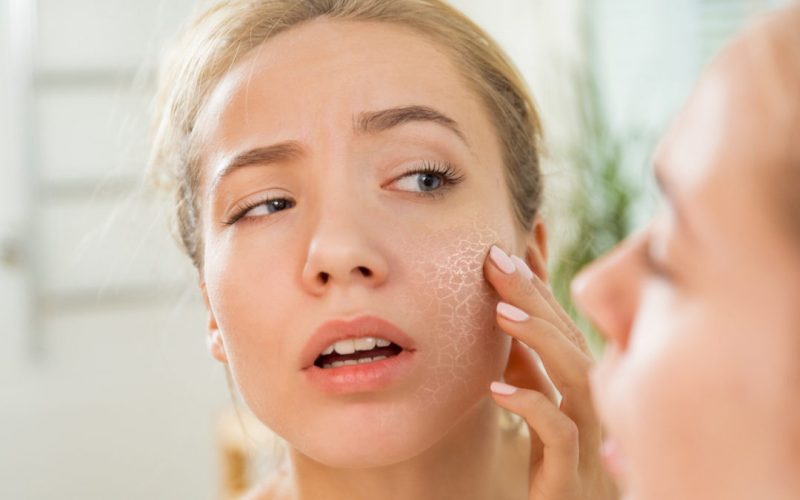What is Dry Skin?
Dry skin is one of the most common skin conditions marked by a lack of the appropriate amount of water in the most superficial layer of the skin called the epidermis.
However dry skin affects males and females equally, but mostly old individuals much more prone to dry skin. This due to that the skin in elderly individuals tends to have diminished amounts of natural skin oils and lubricants.
Furthermore, dry skin may also be a side effect of some medications and a by-product of certain skin diseases as well.
The medical term for ‘Dry skin’ is ‘Xerosis’ which can be prevented from simple treatment measures. Basic dry skin prevention steps include:
- avoid harsh soaps and chemical cleansers.
- frequent and regular use of bland emollients and moisturizers.
- dry skin when untreated may result in complications, such as eczematous dermatitis, secondary bacterial infections, cellulitis, and skin discoloration.
What Are the Causes of skin??
Causes of dry skin can be classified as
- External
- Internal
External factors are the typical underlying causes.
External factors include:
- Cold temperatures
- Low humidity, (especially during the winter)
- Over-washing with harsh soaps,
- Overuse of sanitizers and lipid solvents (alcohol),
Whereas the internal factors include:
- The overall health condition of a person
- Age
- Genetics
- A family history
- A history of other medical conditions Such as atopic dermatitis. Especially, those with certain thyroid diseases are more prone to developing dry skin
Symptoms and signs
- Itching
- Rough dry skin
- Red plaques of eczematous skin (nummular eczema)
- The itchy feeling may worse the severity of dry skin. Itching can result in the development of the “itch-scratch” cycle.
Typical dry skin areas are:
- the lower legs,
- hands,
- arms
What is The Treatment For Dry Skin?
The best and effective treatment for dry skin is daily lubrication with an emollient. Since most dry skin is due to external causes, and external treatments like creams and lotions can be used and effectively control the skin problem.
Light moisturizing lotions for the mild dry skin are:
- Cetaphil lotion
- Lubriderm lotion
- Curel lotion
Highly moisturizing products that characteristically do not flow out of the jar when inverted for the severe dry skin are:
- Vaseline
- Aquaphor
Topical steroid creams are as follows:
- Hydrocortisone 1% cream (mild strength),
- Pramosone 2.5% cream (mild strength),
- Triamcinolone 0.1% cream (medium strength),
- Fluocinonide 0.05% cream (strong strength).
Anti-itch oral medications include:
- Hydroxyzine (Atarax)
- Diphenhydramine (Benadryl)
How to Prevent Dry Skin?
- Use an emollient cream two or three times daily to wet skin
- Avoid exposure to irritants such as solvents
- Cease wool clothing
- Just use cotton and natural fiber clothing
- Dry skin may be prevented by taking lukewarm showers or baths but avoid excess skin scrubbing. This is due to that hot water and harsh scrubbing can take away the natural oils that protect skin and make the skin even drier.
- Dry skin may be prevented by using gentle cleansers. There are so many scented, deodorant, and antibacterial soaps that can be too harsh and wash off natural skin-protecting oils
- Mild moisturizers without perfumes are beneficial for dry skin. Thick and greasy emollients are the best. Basically, moisturizers should be applied within three to five minutes of bathing when the skin is still damp
- The moisture on the skin and in the environment is very significant to dry skin. Maintaining the skin at optimal hydration and using an indoor humidifier may help prevent dry skin
- Special moisturizers which contain lactic acid (AmLactin, Lac-Hydrin), or urea (Urix or Carmol) are also effective in hydrating the skin.
What Are The Best Home Made Remedies for Dry Skin?
Use an Olive Oil Cleanser to Soothe Dry Skin
Olive oil is a great natural oil, which works as a natural cleanser and moisturizer,
- Just rub the oil into your skin and drape a warm,
damp cloth over your face until it cools, - then wipe away the excess oil
Make a Rich, Creamy Avocado Mask
Making a homemade mask of avocado is one more natural way to soothe dry skin.
- Make a puree of half an avocado and
- Mix it with a teaspoon of olive oil;
- You can also add a tablespoon of honey for very dry skin.
- Apply the mask to your face, leave it for 15 to 20 minutes, and then wash it off.
Create an Easy Oatmeal Soak to Appease Your Skin
Add a cup of oatmeal to a warm bath which can naturally rehydrate dry skin, and it helps your skin retain moisture from the bath water.
Exfoliate Your Face With Oatmeal Honey Mask
Oatmeal also produces a great exfoliator or mask.
- Mix 2 tbsp of oats with a tablespoon of honey and a dash of water
- Warm up the mixture, then rubbing it into your skin.
- You can use it just to exfoliate and wash it off right away, or you can also leave it on for 15 to 20 minutes as a soothing, hydrating mask.
Make a Natural Olive Oil and Sugar Scrub
Make a naturally moisturizing exfoliating scrub using a fusion of olive oil and sugar.
- Mix half cup of sugar with 2 tbsp of olive oil
- You can also add an essential oil like lavender if you want, which adds a natural fragrance and can enhance relaxation.
- Gently rub the scrub into your skin, and then wash it off.
- Lastly, use a soothing moisturizer to assure the benefits of freshly exfoliated skin
Use Aloe Vera to Dry, Irritated Skin
Aloe vera is often thought of as a remedy for sunburn relief, but aloe vera gel can be beneficial during the dry winter months, too. It functions by depleting redness and irritation related to excess dryness. According to research, it can even decrease signs of aging, as well as acne breakouts.
Use Coconut Oil Before Bedtime
Coconut oil turns into a solid at room temperature, so you can use it as a moisturizing cream at bedtime or anytime. For rough heels and hands, apply the oil then layer with thick socks or nonlatex gloves.”
Add Your Favorite Oil to Your Bath
Apart from olive oil or coconut oil, you can examine other natural oils that are free from irritants, including jojoba, argan, and avocado oils. To use:
- add a few tablespoons of the desired oil under running bath water
- You can also use a small amount to your skin post-shower to keep is soft and moist
Use Milk Compacts for Irritated Skin
Milk has natural anti-inflammatory properties which also contains lactic acid, a mild, natural exfoliant.
Apply these compresses for your skin for 5 to 10 minutes at a time. It is particularly helpful for irritated skin that is itchy, too.
According to the American Academy of Dermatology, Lactic acid can sting cracked skin, though, so use with caution.
Use a Fruit Enzyme Cleanser or Exfoliant
Fruit enzymes can be a blessing during the dry-skin season.
use a fruit enzyme soaked wash or mask twice per week.



